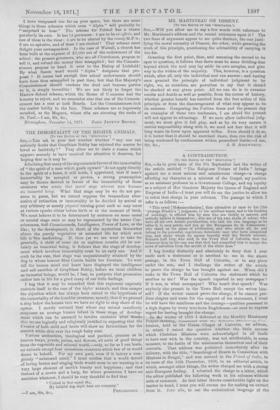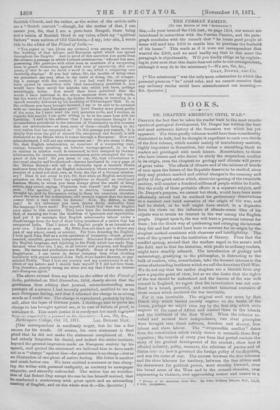A CONTRADICTION.
[TO TIM EDITOR. OF THR SPROTATOR.1
Sin,—As in your issue of the 9th September last the writer of the article entitled "The Religious Future of India " brings against me a most serious and mischievous charge—a charge affecting my character as a minister of the Gospel, my position as an assistant professor in a Government College, and my loyalty as a subject of Her Gracious Majesty the Queen of England and Empress of India—I trust you will do me the justice to allow me to rebut that charge in your columns. The passage to which I refer is as follows :— " This creed [Mokammedanism], thus attractive at once to his [the
average Ilindoo's judgment, to his spiritual wants, and to his theories of sociology, is offered him by men who are visibly in earnest, and entirely believe it themselves ; who are of his own shade of colour, who have all his own Asiatic peculiarities, who talk his own language as he talks it, in racy patois, and not, as the Europeans do, in Johnsonose ; who stand on his plane of civilization, and who, above all, do not belong to the powerful, capricious, detestable race who have conquered him, and about whom ho agrees heartily with the Scotch convert, Beharee Lull Doy, who said, in the Town Hall of Calcutta, that the bitterest drop in his cup was that God had compelled him to accept the news of salvation from the mouth of the white man."
I beg hereby distinctly and absolutely to deny that I ever made such a statement as is ascribed to me in the above passage, in the Town Hall of Calcutta, or in any place under the sun, and I challenge the writer of the article to prove the charge he has brought against me. When did I make in the Town Hall of Calcutta the statement which he ascribes to me? Was the speech reported in any newspaper ? If it was, in what newspaper? Who heard that speech? Was anybody else present in the Town Hall except the writer him- self? If the writer cannot prove the charge, if be cannot pro- duce chapter and verse for the support of his statement, I trust he will have the manliness and the courage—qualities possessed in a high degree by every true-born Englishman—at once to express regret for having brought the charge.
In bile winter of 1858 1 delivered at the Monthly Missionary Prayer-meeting, ueouetnea wind. (1_ ference, held in the Union Chapel of Calcutta, an address,
in which I raised the question whether the little success which Christian Missions wore acknowledged in all lauds to have met with in the country, was not attributable, in some measure, to the faults of the missionaries themselves and of their converts. That address was published immediately after its delivery, with the title, "Searching; of Hearts in Connection with Missions in Bengal," and was noticed in the Friend of India, in its issue of the 16th December, 1858, in an editorial article, in which, amongst other things, the writer charged me with a strong anti-European feeling. I rebutted the charge in a letter, which the editor published the following week in his columns without note or comment. As that letter throws considerable light on the matter in hand, I trust you will excuse me for making an extract from it. Inter alia, to use the ecclesiastical language of the
Scottish Chureb, and the rather, as the writer of the articie calls me a " &etch Convert "—though, for the matter of that, I can assure you, Sir, that I am a pure-born Bengali, there being not a tuimins of Scottish blood in my veins, albeit my " spiritual feehers" were natives of Old Caledonia,-1 say, inter alia, I wrote this to the editor of the Friend of India:—
"You regret to ' sea [from my sermon] even among the converts the working of that intense anti-European spirit which has spread throughout the Empire.' And in proof of this assertion you quote from the sermon a passage in which I exhort missionaries, ' who aro but men, possessing like passions with other MOD, as members of a conquering race, to guard themselves against that SInS8 of superiority, that arro- gance, if that be not too harsh a word to ?We, which a conquering rues inevitably displays.' If you had taken, Sir, the trouble of doing what we ,pretwitere ere very often in the habit of doing, viz., of compar- ing a passage with the context, if you had read the passage you Lava quoted in connection with what immediately preceded it you would have been saved the mistake into which you have, porbapa unwittingly, fallen. You would then have perceived that the wards I have italicized in the above sentence were not my words, but the words of Lard Stanley, the Indian Secretary, as occurring in a speech recently delivered by his Lordship at Fishmongers' Ilan. If, on the evidence you have brought forward, I am to be said to be actuated with an 'intense anti-European spirit,' Lord Stanley must plead guilty of the same, for I have used his very ipsi:isinut verba, and I confess, as regards this matter, I am quite willing to he in the same boat with his Lordship. I said in the address that I have Sometimes thought it a circumstance prejudicial to the interests of Christianity in this country that our missionaries—at least, most of them—should belong to the very nation that has conquered us.' On this passage you remark, 'Ibis simply that even the gift of eternal life, recognized and desired, is still distasteful to the Hindu when it Comes through a European.' How yea misunderstand, I will not say misrepresent me Do you mean to deny, Sir, that English missionaries, as members of a conquering race, occupy, humanly speaking, an inferior vantage-ground, in so far as success in mission work is concerned, to that occupied by German missionaries, for instance, whose countryman never attempted the con- quest of thia land? Do you mean to say, Sir, that oshortationa to universal charity and brotherhood—leasons inculcated in every page of the Divine Record—will tell as effectually upon a heathen Hindu audience from the lips of an English missionary, whose countryman are masters of a land not their own, as from the lips of a German mission- ary ? Does it not occur to you, Sir, that when an English missionary preaches on the text, 'Love thy neighbour as thyself,' an intelligent, heathen Hindu, to whom you have always given the credit of being astute, may retort, saying, 'Phyideian heal thyself and thy country- men. "rho speaker,' you proceed to observe, himself educated, brought up, paid by Europeans, owing to them his conscious elevation above the MUSS of his countrymen, still secretly regrets that the favour comes from a raee which he deteets.' Now, Mr. Editor, is this just? Is the inference you have drawn fairly deducible from the language I have used? For myself, I thank God that the English over came to this country. They have been the instruments, under God, of rescuing me from the thraldom of ignorance and superstition. And yet I do maintain that English missionaries labour under a disadvantage from tho fact of their being members of a nation that has conquered India. That I detest the English people is an invention of your own. I detest no men. My 13ible does not teach me to deteet any man of any colour, creed, or country. Par from detesting the English, I look upon John Bull as a mble specimen of humanity—frank, genial- hearted, nnuelflah, generous, independent. Educated from childhood in the English language, and rejoicing in the Faith whieh has made Eng- lishmen what they are, I am, to all intents and purposes, and English- man. My tastes and predictions are English. Some of my friends are Englishman. I am never in better company than when chatting familiarly with genial-hearted John Dull, stout-headed Sawney, or gay. minded Paddy. That I love my country and my countrymen is an in- stinct of my nature, and I should hate myself if I did not love them. You, therefore, greatly wrong me when you say that I have an intense anti-European spirit,"
The above extract from my letter to the editor of the Friend of published on 23rd December, 1838, clearly sbowe that the gentleman then editing that journal, misunderstanding some passages of a sermon I had recently published, ascribed to me an anti-European feeling, and that I rebutted the charge in as strong words as I could use. The charge is reproduced, probably by him- self, after the lapse of thirteen years. I challenge him to prove the charge he has brought against me, or in case of failure of proof, to
withdraw it. This much justice it is surely not too much tosexpeet frnrn an roopar4a1,1e 3am,a4.1 we tlac Atiput.eacY,P.--I am, Sir, Sco.,
Berhampore College, Oct. 18, 1871. LAL BEHARI DAY.
[Our correspondent is needlessly angry, but he has a fair excuse for his wrath. Of course, his own statement is final proof that he did not make the statement complained of. We had utterly "forgotten his denial, and indeed the entire incideet, beyond the general impresson made on European society by his speech, and quoted the statement we believed hum to have made not as a charge "against him—for patriotiam is no charge —bat as an illustration of one phase of native feeling. His letter is another and much better one. We have omitted a sentence or two charg- ing the writer with personal malignity, as contrary to newspaper etiquette, and absurdly unfounded. The writer has no recollec- tion of Lai Behari Day except the one he has himself revived, that he conducted a controversy with great spirit and an astounding mastery of English, and on the whole won it.—ED. Spectator.]



































 Previous page
Previous page